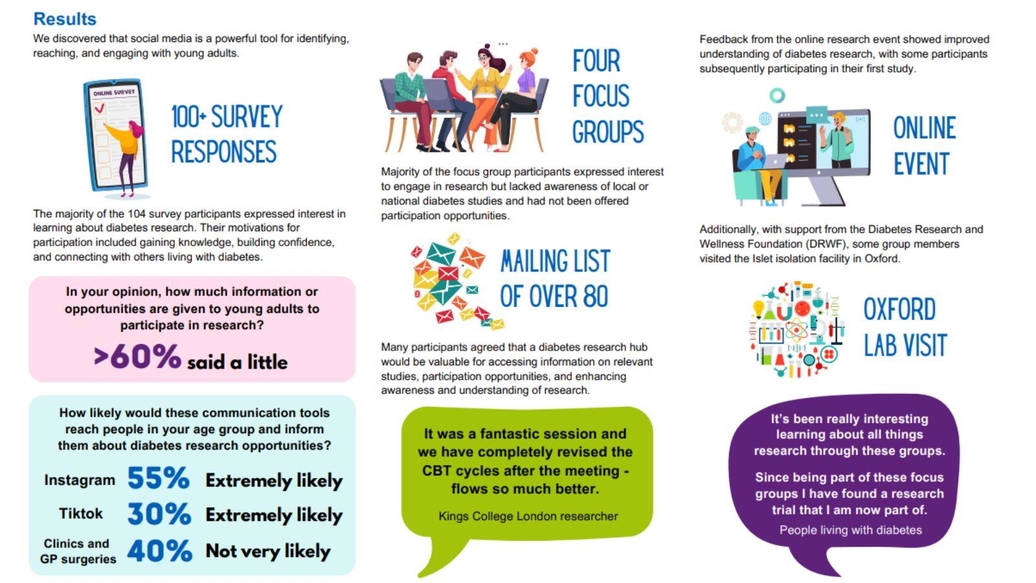Putting young people with diabetes at the heart of research
- 18 April 2024
- 3 min read
A recent study has demonstrated the pivotal role that young people with lived experience can play in shaping and driving diabetes research.
It was funded by the National Institute for Health and Care Research (NIHR) Clinical Research Network Wessex small grant scheme and led by Kelly Carden and Naomi Parnell from West Hampshire’s Diabetes Service for Southern Health NHS Foundation Trust.
Kelly Carden, Diabetes Specialist and Research Nurse explains more about the study and why it was needed: “We identified that some young adults transitioning from children to adult diabetes stop engaging with the diabetes teams. We identified that if there is a gap when going through the transition period, then young adults would not get involved in research. We realised that these young adults are an underrepresented community.”
Kelly continues: “We hoped to understand how people access information about specific pieces of work that are recruiting patients and the public, their motivations for getting involved, and importantly, how it can be made easier to participate and encourage higher numbers of people to take part in research studies.”

What the study involved
The project involved a survey (with over 100 responses), four focus groups, a virtual conference, and a visit to a laboratory.
The survey on social media aimed to gauge the awareness and motivations of young adults aged 18-30 years. Utilising peer support, four patient focus groups were organised to gather insights and preferences regarding diabetes research. Participants collaborated with colleagues from King’s College London to contribute insights from the initial stages of a study. This collaboration ensured the research addressed their primary concerns, remained relevant to experiences, and aligned with their beliefs on enhancing the lives of individuals living with diabetes.
A virtual conference was hosted covering topics suggested by the group, such as diabetes and mental health, pathways for research involvement, and first hand experiences of research participation.
The study worked with clinical diabetes teams, peer organisations, researchers, community organisations, local and digital stakeholders including the diabetes online community as well as young adults (aged 18-30 years) living with diabetes.

What the research told us
The responses to the survey helped establish views regarding the types of research this age group are interested in. It also reinforced views that social media is a very powerful tool in identifying, reaching and engaging with young adults. The majority of the survey participants expressed an interest in learning about diabetes research. Their motivations for participation included gaining knowledge, building confidence, and connecting with others living with diabetes.
The focus groups identified several themes and practical suggestions including an interest to have a diabetes research website, with local diabetes studies. Focus group participants also expressed interest to engage in research but lacked awareness of local or national diabetes studies and had not been offered participation opportunities.
Comments from attendees at the focus groups demonstrated the power of engaging with the young adults.
Naomi Parnell, Assistant Clinical Research Practitioner, comments about the research: “There are a lot of factors that impact how people can connect and engage with diabetes. We need to be a bit more creative and look at ways in which we can reach out and connect.”

What next?
The study has had widespread coverage with an article written alongside a researcher at King’s College London, for publication in the Diabetes Wellness News. The study poster was also presented at the national Diabetes UK conference on 17-19 April.
The findings emphasise the significance of clinical teams initiating discussions about research with young adults living with diabetes. In terms of future aspirations, establishing a dedicated diabetes research hub may increase opportunities for their involvement in research design and implementation, fostering a deeper understanding of participation and mutual benefits, including the potential impact on future diabetes care and treatments.
For researchers, involving individuals with lived experience will provide valuable insights into the priorities of this demographic. This hub will serve as a central resource for study information, recruitment, and grant proposals promoting patient participation and involvement. By forming a community of young adults living with diabetes, it will facilitate peer support, potentially reducing feelings of isolation and loneliness as highlighted in our focus groups, thereby increasing motivation for diabetes self-management.
For more information about the study, please email kelly.carden@southernhealth.nhs.uk


